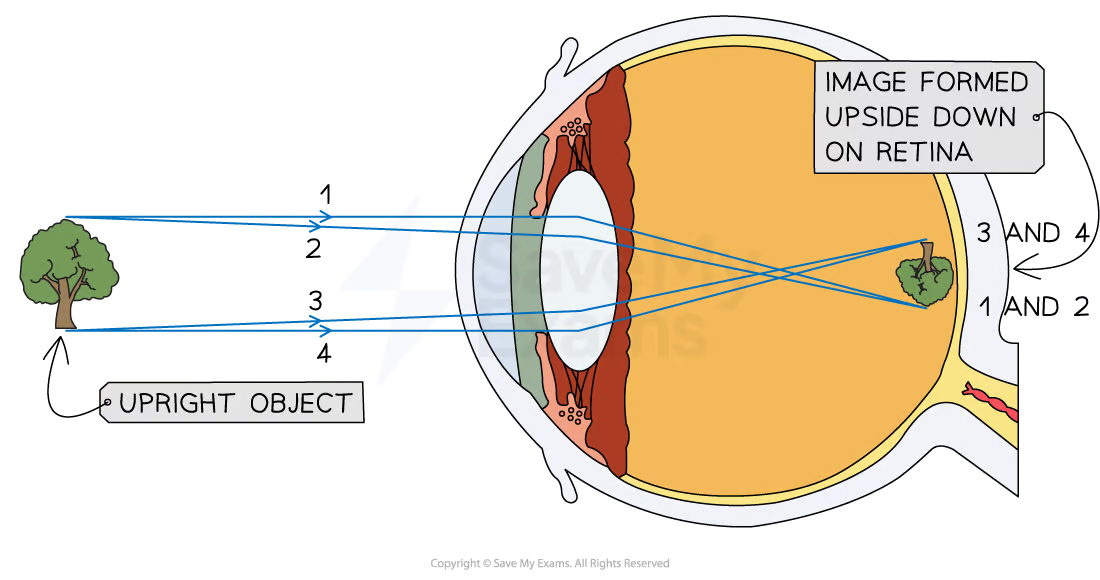A later exposition of this at https://riswey.blogspot.com/2025/02/resolution-to-issue-regarding-existence_24.html is probably better
---
The world is present.
We then learn that there are components to our sense of the world. Obviously we close our eyes and the world goes black. Light must enter our eye. Damage to the eye upset our view of the world.
We also discover some odd things like we see the world upside down.
Tracing the process we find that senses arrive at the brain before we sense anything. Damage to a nerve in our arm can leave our arm feeling numb. The arm does not feel, it delegates feeling to the brain.
So it appears that the sense of the world occurs "in" the brain. Now it is not exactly clear what "in" means. The skull is not a room with a window out of which we see the world.
As Buddha points out to Ananda in the Shurangama Sutra if this was true you would be able to see the inside of the room. To some extend we can in that we experience thoughts, feelings and emotions that are only present inside the body. But this is not vision. Our vision is not inside a room. It is not outside a room either. The sense of "inside" or "outside" is unsuitable. Yet we have just argued that nerve impulse must make it to the brain for sense to occur.
Skipping forward to the mistake. This fact that nerves must connect stimulation to the brain for the stimulation to register as an existing event suggests that the process of consciousness is occurring in the locus of the brain.
That means that when we look at the apparent world that must be inside a brain. So we are in The Matrix film territory. How do we know that the following scenario is not true, and our brains are not nurtured in a vat with the world being fed in via stimulus from a computer.
Another way to get here is to consider the famous question: how do I know that when I see "green" it is the same colour as you see. Perhaps our colours of Red and Green are swapped. As long as it is consistent we can never know. But this raises the whole issue of consciousness being a personal private experience that cannot be shared.BUT there is a really fundamental error in this thinking.
Even in the brain in a vat situation there is a quality of mind that is not in the vat! The actual presence of things does not occur in the brain and so not in the vat. Everything else is in the vat but not the actual "presence" of existence. The brain does not "make" that.
Now how do we deduce this.
Looking at vision we are aware of all the parts of the process. If "I" or "existence" was a stage in the process then we would only have existence at one point in the process. But we see it all. We can examine the sense arriving in the eye, we can examine the perception as we determine what we are looking at, we can determine the thoughts that surround this, we can determine any emotions that this causes. If "I" or "existence" was just a step in this process then we would not have this "overview" of the processes.
So the mistake is to think that "I" or the "existence" of sensation is just a creation at the end of the process. "I" or "existence" is present all the way along!
When Descartes says "I think therefore I am" he has identified the important parts, but has mangled them up.
The "I" and the "is" (existence) are inseparable. It is not that the "I" exists as a separate thing. The existence of things means there is an I. But the "I" is not a new thing, it is the existence itself.
That is the core mistake.
So when go back to the top and look at senses starting nerve impulses which travel to the brain, and any break in this chain causes the sensation to fail: this is all correct. And the brain indeed needs to be present in the chain, but also the initial stimulation needs to be there. All parts are necessary.
The reason we like to make the brain more important is because of a latent belief that "inside" our body exists a "self." We are expecting there to be an "I" at the end of this chain like a person waiting for a phone call inside the skull.
But the "I" is not in the chain at all. The "I" is the experience of existence, the actual quality of experiences actually being there. They are actually there for a self. But there is no difference between the "I" and the "existence." This all sets the backdrop for the actual processes that are occurring. But they are not part of these processes.
===
Possible 3rd approach. #TODO
When we close our eyes and there is no light. It turns black. Where is this black? It is not the result of stimulation of nerves. It is the absence of the stimulation of nerves.
It is like silence in the ears. You cannot hear silence. So how can silence happen.
Now in a sense it is still a relative existence in that we notice silence when a sound stops. But there is more to it than that. How many times has there been an annoying sound, we are observing it, it is very real and present. But somehow we get distracted and forget about it to look at something else. Sometime later we remember that there was this annoying sound go back to paying attention our hearing and realise there is silence. So it is relative in that there is no sound, where before there was a sound, so the silence is relative. If we had no possibility of hearing then there would not even be silence, there would be nothing. But because we can hear, when we do hear then not there is silence. Now where is this silence? There are no electrical signal entering the brain here.




No comments:
Post a Comment